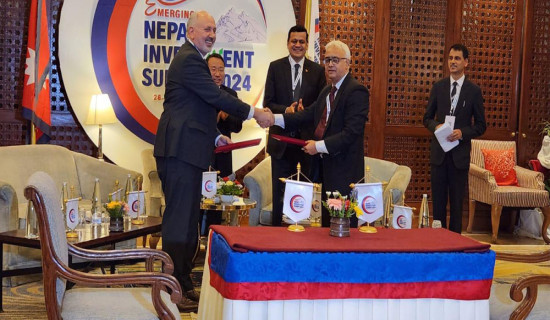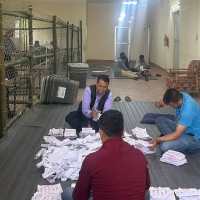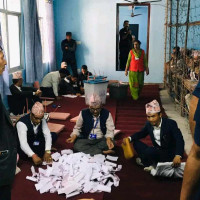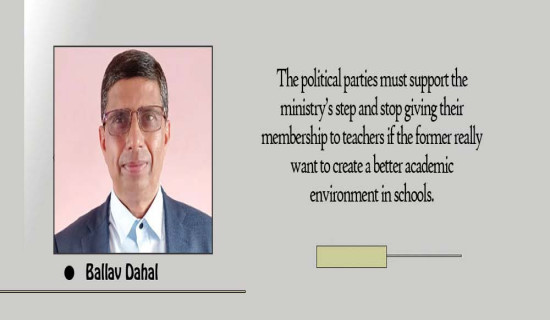- Monday, 29 April 2024
'Federal democracy has no alternative'
The nation is marking the 74th National Democracy Day today. The celebration is being made amid negative propaganda about the federal democratic republican system the nation has adopted. In this regard, Minister for Communication and Information Technology and government spokesperson Rekha Sharma spoke to Consulting Editor of Gorkhapatra Corporation Upesh Maharjan, Purushottam Khatri of The Rising Nepal and Birendra Oli of Gorkhapatra at her official residence on the eve of Democracy Day on Sunday. Excerpts:
How do you assess the one-year term of the government led by Prime Minister Pushpa Kamal Dahal 'Prachanda'?
The government has already reviewed its one-year term led by Prime Minister Pushpa Kamal Dahal 'Prachanda' on December 26, 2023. The government has done a serious self-review of the works done by the government and has set the future priority of the government. The main focus of the government is governance, social justice and economic prosperity. Keeping these three agendas at the centre, the government has been moving ahead firmly.
Although some forces are working to depict the present federal democratic system as a failure, the alternative to the federal democratic system is the reformed federal democratic system only. The government within the last year has successfully cleared the false narratives and institutionalising the achievement gained through the political movements.
In a government that operates by the rule of law, no one is allowed to breach the law. Everyone should adhere to the constitution and rule of law. The government has become successful in establishing the notion that a person breaching the law will face legal consequences. Fame, designation and political nexus do not count before the rule of law.
The government has been moving ahead to clear the frustration of the public addressing the issue of citizenship, and loan sharks by forming a commission. Within a year, very important dynamics have been established in the sector of good governance, social justice and the road to achieving economic prosperity.
Although the government has succeeded in instilling hope in the public, in which areas do you think that the government has not been able to work satisfactorily?
There are certainly some works and programmes which cannot be accomplished in a year, but such programmes would be implemented gradually. We have been able to instill hope in the public. We believe that the government has no right to commit mistakes.
It would be wrong to think that this government has failed when the Prime Minister himself made self evaluation and said that he could not do as much as he wanted. It should be understood in a way that the present government has wished to do more.
From the Bhutanese refugee, Lalita Niwas land grab case, and gold scam to the Bansbari Shoe Factory scandal, the government is trying to send a message that is action-oriented on corruption control, but it seems that it has not been completely successful. What are the reasons for this?
As per the principle of separation of power government is the executive body and there are legislative and judiciary which are equally important.
And these two bodies are independent to function from their sides. The government has not just arrested the low-profile public but has been able to arrest some high-profile figures which is an achievement in itself. The government has also booked many high-profile political leaders in the fake Bhutanese refugees scam, gold smuggling, Lalita Niwas land scam and other cases. Based on available facts and proof, the government is ready to bring anybody to legal action. The verdict given by the court is final in these cases but the government has set an example in breaking VIP culture by arresting high-profile people attached to the case and taking legal action against them.
What pressures did the government face while controlling corruption and establishing good governance?
People in favour of good governance, and transparency have supported the good endeavours of the government. The government has surpassed unwanted pressure and has been just, and unbiased while delivering services. It is also true that the government while taking action against anybody, should not be guided by any prejudice.
How do you address people's discontent that the system has changed but the situation of the public has not improved comparatively?
We have become able to alter the political system by the sacrifice of many lives, but in reality, the livelihood of many grassroots public has not changed as expected. If we become able to revive the sick industries we will be able to create more jobs we will become more or less self-reliant. The equitable distribution of change and achievement should reach people and communities of all backgrounds while working in the sector of social justice. Equitable distribution of resources can bring positive change in the lives of people when three-tier governments work in a coordinated way.
Periodic elections and democracy are synonymous with each other, but there are increasing complaints that the election has become expensive, how can this be addressed?
Whatever the present electoral system we have adopted, it has already been arranged in our constitution. The present leadership of the government alone cannot amend this electoral arrangement instantly.
But, What I think is that this issue can be settled by maintaining a common understanding among the political parties.
However, we political parties are responsible for making the election extravagant and expensive. To win the election one should have strong agendas that appeal the public and the recent elections have established the fact that one cannot win the election by spending beyond the EC's code of conduct.
Our party during the 2008 election was able to win two-thirds without doing much hullaballoo. Making the electoral system less expensive is the long-term planning and agenda of all the political parties.
On the eve of the Democracy Day today, we have been encountering various criticism regarding the present political system, and on the other side, we have been facing challenges to implement the federal democratic system. How analyse these challenges?
I think it depends upon two things, regarding the implementation of the federal democratic system, there has been planted and vested interest being made to alter this system. As a result, today, we have been hearing negative propaganda on this system from some dogmatic and reactionary forces.
We also have some limitations and problems within us, taking advantage of our parties' problems and limitations, some forces are staging various movements at present keeping their vested interest in creating negativity towards this political achievement.
The foundation of our political system lies in the achievement of the 1950s movement. As we are marking the 74th Democracy Day we have to commemorate the sacrifice of our freedom fighters. All political changes and the nation being a federal democratic republic has been based on the foundation 1950s movement to establish democracy.
Chief Ministers from the provinces are complaining that they could not work because the federal government did not give necessary laws, when can this problem be addressed?
As I have already mentioned the two Acts are mainly important for now, and they are the Federal Civil Service Act and Police Adjustment Act, which we had already tabled in the previous session of the parliament but could not pass them.
Similarly, Federal Education Act, Forest Act and Land Act which have been seen as obstacles to national development also need to be passed from the present session of the House. Federal Education Act is another important act to implement and exercise the concept of federalism.
It's been a long time, since we have come through the signing of the Comprehensive Peace Accord (CPA) and still transitional justice process has not been ended because of the differences between the political parties due to which, no specific provision could not be arranged in the act regarding transitional justice. Taking transitional justice to a logical end should be the issue and subject of the nation. It should be not an agenda or bargaining tool of any abstract party. That is why, we have been seeking national consensus and agreement among the parties to conclude the transitional justice. The government wishes to endorse this transitional justice-related act through the present session of the parliament. Thus, the government has accorded a high priority to introduce all necessary laws that hinder to implementation of the federalism and democratic system.
What are the current coalition government's plans to revive the economy hit by the Coronavirus and earthquake?
When the present government took office, the national economy was in a critical situation. Although the economy has revived to a significant degree the goals are yet to be achieved.
Today, all the ministries have been instructed to bring highly prioritised projects and plans that can be implemented instantly so that the government can also invest and earn more revenue. That is why, the PM and Minister for Finance have been holding several levels of meetings to attract more investment. The government has also working on the 16th Plan, and we are also planning to introduce some intervening types of projects through an upcoming policy and programmes of the government to create more jobs within the country keeping the national economy at the centre.
What are the plans, programmes and vision that the government has to stop the present brain-drain trend citing the lack of job opportunities here?
The first thing to short out this problem is the creation of more jobs within the country. The government is selecting such projects which can create the possibility of more jobs. Reviving the sick industries and investment in the IT sector from the Ministry of Communication and Information Technology can create more jobs in the future. Similarly, the investment in the tourism and agriculture sectors can create more jobs. Currently, there are two types of people going abroad, one strata of people are who have real problems sustaining their family and livelihood and another type of people are going out despite opportunities here. By creating more job opportunities we can retain the people who go abroad due to the lack of job opportunities at home.
The government especially the MoCIT has been seen active in regulating social media by introducing cyber security policy. What necessary planning is being made by the Ministry in this regard?
The government is establishing a separate cyber security centre after the endorsement of the cyber security policy. The sector of information technology and communication is very dynamic and changing all the time. But, our national laws and policies made in this sector are very old. That is why the Ministry is preparing to draft and introduce IT and communication sector-related laws at the earliest possible. The government has its understanding that any social media platform which we operate here must operate and function adhering to our national laws and policy. And under this understanding, we have tried to regulate some of the social media platforms. Today, TikTok has approached the government for its reoperation, and they have submitted their application to the government for opening the service with a commitment to adhering to Nepal's law and policy.
As we are marking Democracy Day today, what message do want to give on this special day when the regressive forces are raising their heads?
The Seventh of Falgun marks a huge achievement made by the people in establishing Democracy by overthrowing the autocratic Rana regime. On this day we commemorate the heroes who fought for the country. We have been able to establish a federal democratic republic due to the sacrifice of many freedom fighters.
Some elements have been trying to portray that this achievement has been gained out of nothing. The elements which have been trying to take advantage of the free and transparent political situation, will not succeed. Democracy has given voice to the people. At the same time, we all should realise our weaknesses, and mistakes to make this system stronger and trustworthy.
















